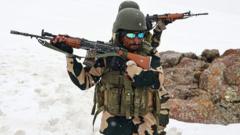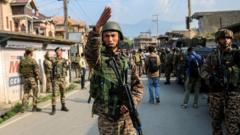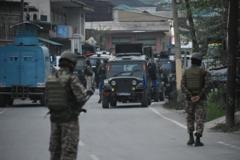In the Pakistani-held portion of Kashmir, communities are taking precautionary measures amidst fears of escalating military tensions following a terrorist attack in India that claimed 26 lives. Locals are bracing for the potential repercussions of another conflict between India and Pakistan over the long-disputed region.
Tensions Rise in Kashmir as Locals Brace for Potential Conflict

Tensions Rise in Kashmir as Locals Brace for Potential Conflict
The aftermath of a fatal attack on the Indian side of Kashmir has heightened fears among residents of the Pakistani-administered region about a looming military confrontation.
In the picturesque Himalayan territory of Kashmir, life is becoming overshadowed by a looming sense of dread after a recent terrorist attack on the Indian-administered side. Following the incident, which left 26 people dead, residents of the Pakistani-administered region are on high alert, bracing for possible military escalation between the two neighboring nations.
In Muzaffarabad, the capital of the Pakistani-held territory, families are busily reinforcing their bunkers, ensuring their evacuation plans are ready. Hospitals have been instructed to stockpile essential medical supplies, and local schools are conducting first aid training sessions for students. There's a palpable anxiety in the air; individuals are reflecting on past conflicts and the profound suffering that accompanies them.
"God willing, nothing will happen," shared Azeem Gilani, a baker from Muzaffarabad, expressing a mix of hope and apprehension. He noted the historical context of tensions in the region, saying, "We have seen this before. But if the situation worsens, Kashmiris on both sides will suffer."
With the region long known as a flashpoint in the rivalry between India and Pakistan, families remain vigilant, preparing for a repeat of the devastating impacts of prior clashes. The conflict over Kashmir has persisted for nearly eight decades, and the fate of its people hangs delicately in the balance. As locals espouse their desire for peace, they are well-aware that the region's beauty is often marred by the specter of violence.
In Muzaffarabad, the capital of the Pakistani-held territory, families are busily reinforcing their bunkers, ensuring their evacuation plans are ready. Hospitals have been instructed to stockpile essential medical supplies, and local schools are conducting first aid training sessions for students. There's a palpable anxiety in the air; individuals are reflecting on past conflicts and the profound suffering that accompanies them.
"God willing, nothing will happen," shared Azeem Gilani, a baker from Muzaffarabad, expressing a mix of hope and apprehension. He noted the historical context of tensions in the region, saying, "We have seen this before. But if the situation worsens, Kashmiris on both sides will suffer."
With the region long known as a flashpoint in the rivalry between India and Pakistan, families remain vigilant, preparing for a repeat of the devastating impacts of prior clashes. The conflict over Kashmir has persisted for nearly eight decades, and the fate of its people hangs delicately in the balance. As locals espouse their desire for peace, they are well-aware that the region's beauty is often marred by the specter of violence.





















